Australian Ambassador to the Philippines H.E. Steven J. Robinson AO (left) and UNDP Philippines Resident Representative Selva Ramachandran (right) at the ceremonial signing of the partnership between the Australian Government and the United Nations Development Programme which aims to strengthen disaster resilience of targeted local governments in the next six years.
Metro Manila – The Australian Government and the United Nations Development Programme (UNDP) in the Philippines signed an agreement for a new initiative that will strengthen the disaster and climate resilience of targeted local governments in the Philippines. Through the strategic partnership, the Australian Government will invest PHP630 million (AUD18 million) for the initiative to be implemented over the next six years.
Dubbed as the SHIELD (Strengthening Institutions and Empowering Localities against Disasters and Climate Change) Program, the initiative will particularly work with local governments, as the first responders to emergencies, by building their institutional and community resilience capacities against natural hazards and climate change. SHIELD will be implemented by UNDP, together with consortium partners UN-Habitat, Philippine Business for Social Progress, National Resilience Council, and the Consortium of Bangsamoro Civil Society.
While significant progress has been made in disaster risk reduction and management and climate action, the Philippines remains among the countries most vulnerable to natural hazards and climate change impacts globally. The cost of disasters to the country is significantly high, with local governments and communities bearing the brunt.
Australian Ambassador to the Philippines Steven J. Robinson AO said this new investment affirms Australia’s continued commitment to the Philippines as a dependable partner in building the long-term disaster and climate resilience of its institutions and its people.
“Enhancing resilience remains a high priority for Australia, particularly in the Philippines, which is extremely vulnerable to disasters and the impacts of climate change. Through SHIELD, we will work with governments, private sector, civil society and academic institutions to enhance and sustain community resilience,” Ambassador Robinson further added.
The SHIELD program endeavors to accelerate resilience-building efforts in the Philippines by collaborating with multiple stakeholders to unlock financing and implement risk-informed and inclusive resilience actions at the local level. The initiative will also support the national government establish the needed enabling environment and work with Philippine scientific agencies to produce tailored and accessible information that will inform local resilience actions.
“Through SHIELD, our ultimate aim is for our target communities to be safer and more resilient to the impacts of natural hazards and climate change, taking also into account the lessons brought about by the COVID-19 pandemic. It bears noting that the program also puts importance on gender equality, disability, and social inclusion in the context of resilience-building,” noted Dr. Selva Ramachandran, UNDP Philippines Resident Representative.
The six-year program will be implemented in ten of the country’s most vulnerable provinces to disaster and climate change impacts. It will also cover Metro Manila, given its vulnerability to earthquakes and its economic significance, along with the Bangsamoro Autonomous Region in Muslim Mindanao (BARMM), with the increasing disaster and climate vulnerability of conflict-affected areas.
####

 Locations
Locations



